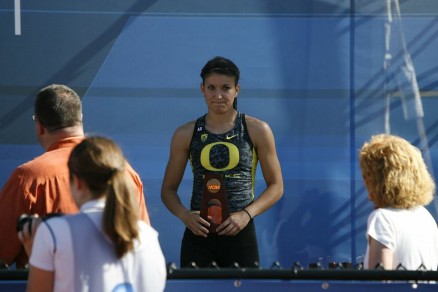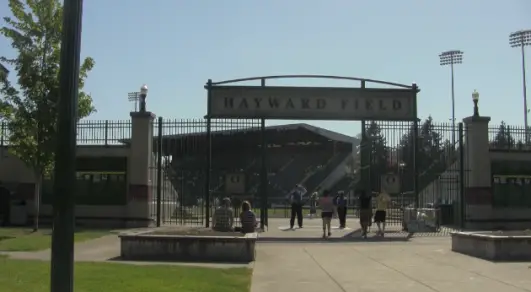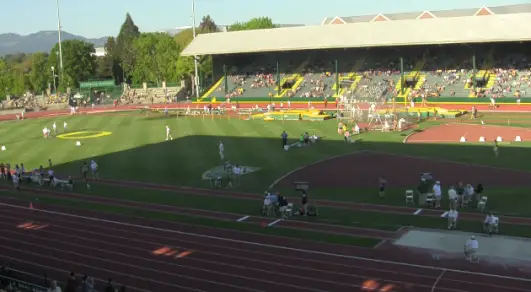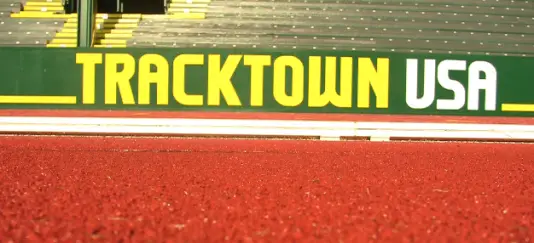As the the final runner crossed the finish line on the last day of the NCAA Track & Field Championships Saturday, the Ducks – particularly the women’s squad – left behind a potentially historic season incomplete. It wasn’t what many had hoped for, but still shows what a great program Oregon has. Even on a day where things might have gone better, our teams sprinted away with three individual first place finishes, a third place team finish for the women and a fourth place for the men, which for most schools would be a Godsend.
While Kansas took home the women’s crown, Texas A&M and Florida managed to share the men’s title. Perhaps the true winner of NCAA Championships was once again, historic Hayward Field. She graced athletes from all schools with an enthusiastic welcome from consistently large turnouts and ideal conditions for running, jumping and throwing. When it comes to sports venues, this grand old lady is simply a champion among champions.
The conditions that this grand old lady provided are rare indeed when looking back at some of the past venues for the NCAA Championships. Last year’s championship meet was held at Drake University in Des Moines, Iowa, where the entire second day of competition was at first postponed and then finally suspended at 10:15 p.m. due to rain and lightning delays.
Even more telling was this year’s Western Preliminary Rounds, held at the University of Texas in Austin, where torrential downpours and threats of athletes being struck down by lightning delayed much of the competition. When it wasn’t raining, sticky ninety degree humidity slowed the pace and potentially threatened the health and safety of some of the sport’s supreme distance runners.
To no one’s surprise, poor weather greatly affected the attendance at those venues. Despite Drake’s seating capacity of 14,500, the attendance on the first day of competition last year barely reached 4,000, while the second day – which was canceled due to the poor weather – reported a slightly better turnout of 7,187 fans;still only half of capacity.
On the flip side, this past weekend at Hayward Field presented consistent, ideal conditions that permitted both an excellent turnout, as well as an atmosphere for record-breaking performances — with no fear of being struck down by lightning or washed away in a flood. Oregon’s own English Gardner ran the 100 meter race in 10.96 seconds, setting both a school and Pac-12 record. In the women’s 100 meter hurdles, Brianna Rollins of Clemson set the collegiate and meet record in the semi-finals, and then broke it again in the finals, breaking her own record with a time of 12.39 while winning the event. Similarly, Kori Carter of Stanford shattered the collegiate and meet record in the women’s 400 meter hurdles with a time of 53.21. All of these records, along with the many others not mentioned here, were seen in front of a stadium that was virtually filled to capacity with knowledgable, screaming fans for every day of the competition.
The conditions during this past weekend were typical of Eugene during this time of year, bright blue skies with temperatures from the mid-seventies to low eighties, no torrential downpours, lightning storms, floods or tornadoes. Moreover, it would take much more than rain (the worst that would happen regarding weather) to deter swarms of Eugenians from flocking to a National Championship Track & Field meet. Track & Field is not a collegiate sport with a “set” championship location, instead switching every year, much like football or basketball, but the National Championship is coming back to Eugene in 2014. Given the ideal setting and incredibly supportive conditions, why shouldn’t Hayward Field join the ranks of Omaha and Oklahoma City (home to the baseball and softball championships) and have the annual NCAA Track & Field Championship meet held in a set location — That being historic Hayward Field in Eugene? Eugene is, after all, Track Town USA, where the very essence of running is so imbued into the local culture and history that it only makes sense to hold such large and important meets at Historic Hayward Field.
Related Articles:
Chip Kelly Update: Everything's Good Again ...
Chip Kelly Update: Wailing and Gnashing of Teeth
Shock and Awe -- The Oregon Ducks' Football Hangover Effect
Despite Lopsided Score, Georgia State "Never Stopped Believing"
Hope Springs Eternal for Ducks
Incompetent Pac-12 Officials: How Do You Miss ALL of THIS?
Mathew recently graduated from the University of Oregon with a major in both English and Cinema Studies. Growing up he played Hockey his entire life, and was able to reach the Junior A level of play his Freshmen year of college. He therefore not only has an intense passion for sports, but has a unique understanding and appreciation for all athletes.




